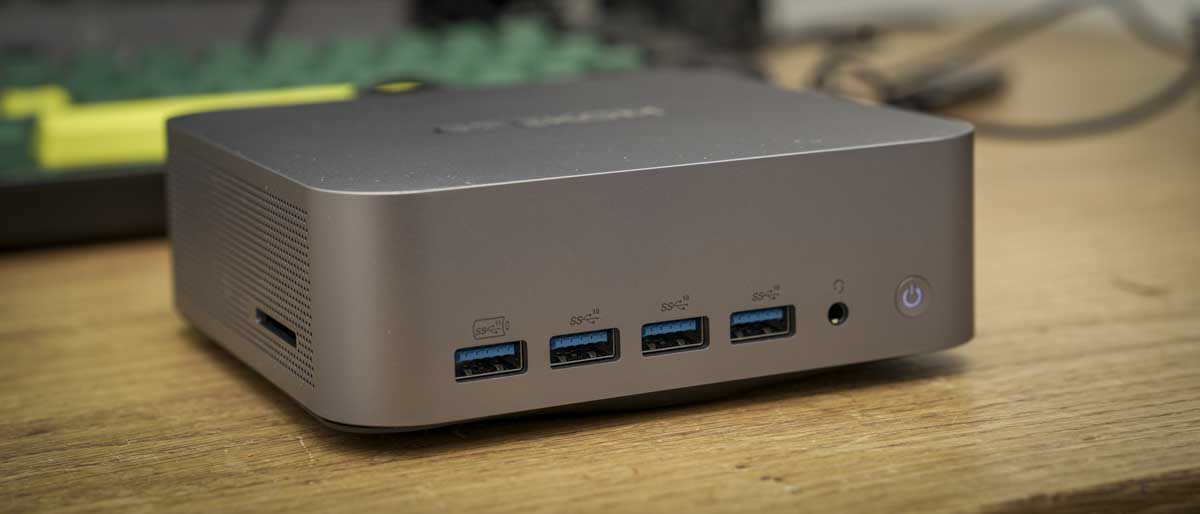TechRadar Verdict
The Geekcom GT1 Mega is one of a new generation of high-performance mini PCs with a host of AI-driven tasks and abilities that are coupled with Intel's latest CPU and GPU, which handle both processing and graphics. The latest connections boost the performance, and there are plenty of connection options to expand its abilities despite having limited internal upgrade options.
Pros
- +
Excellent performance
- +
AI-boosted processing
- +
Supports 8K displays
Cons
- -
Limited storage options
- -
Non-upgradable graphics
- -
High price tag
Why you can trust TechRadar
Geekcom GT1 Mega: 30-second review
CPU: Intel Core 14th Gen Ultra 9-185H
Graphics: Intel Arc Graphics
RAM: 32GB DDR5, up to 64GB
Storage: 2TB PCIe Gen 4 SSD
Rear Ports: 2 x USB 4.0, 2 x HDMI 2.0, 2 x RJ45 LAN (2.5G), 1 x DC in,
Front Ports: 4 x USB 3.2 Gen2, 1 x USB 2.0, 1 x 3.5mm stereo jack, 1
Side Ports: SD Card 4.0, 1 x Kensington Lock
Connectivity: Wi-Fi 7, Bluetooth 5.4
Audio: HDA CODEC
Camera: N/A
Size: 135mm x 132mm x 46.9mm
OS Installed: Windows 11 Pro
Accessories: VESA Mount, free USB-C hub
The Geekom GT1 Mega instantly sets the tone with the high-quality metal exterior, with its row of USB Type-A ports across the front and a host of connection options across the rear, highlighting that this is something a little different. Inside is the latest 14th Gen Intel Ultra processor, which provides impressive performance in such a compact machine.
The new processor, which in our review sample is the U9-185H option, with the U7-155H also available, enables close integration with AI-enabled features. These work with the Intel NPU, which has the effect of significantly accelerating tasks like AI computation and video rendering, which in real-world terms is an invisible feature that you only witness through the speed of the processing.
There are other hints of this small machine’s power beyond editing 4K footage in DaVinci Resolve, which it handles as if it's a machine many times its own size, and the smooth running of high-impact games. Connecting up two 4K displays is well within its abilities, with an option to support up to four 4K monitors or one 8K through the two HDMI ports and USB4.
Sure enough, for video editing and 3D work, the Geekom ploughs through the processing without issue, and checking all Microsoft Office apps just doesn’t pose any type of stress on the system. While all this power and speed are impressive at such a small size, it is worth noting that the fans will kick in early—there’s a lot of cooling to be done—so if you like silence, while not loud, that fan whirr is apparent.
Then there are the options to upgrade, which, being a mini PC, are limited: a slight boost to the internal RAM and SSD but little else. However, the USB4 ports afford plenty of other expansion options with external SSDs and eGPUs.
As a true mini PC, the GT1 Mega will fit any workspace without issue, and the small VESA mount ensures that it’s easy to fit and mount as needed. That, coupled with the 65W power consumption, means that it can easily be transported and powered in the field with a power station such as the Bluetti AC70.
But is it the best mini PC we've tested? Well, while this is a great compact solution, it comes with a high price tag, especially considering the limited upgrade options. So, if you’re looking to spend this amount, it might be better to look at a larger desktop solution. However, considering the design and advanced technology, on its own or partnered with other devices to expand its function, it’s impressive and an ideal solution for any professional—creative or otherwise—who requires some serious processing power.
Geekom GT1 Mega: Price & availability
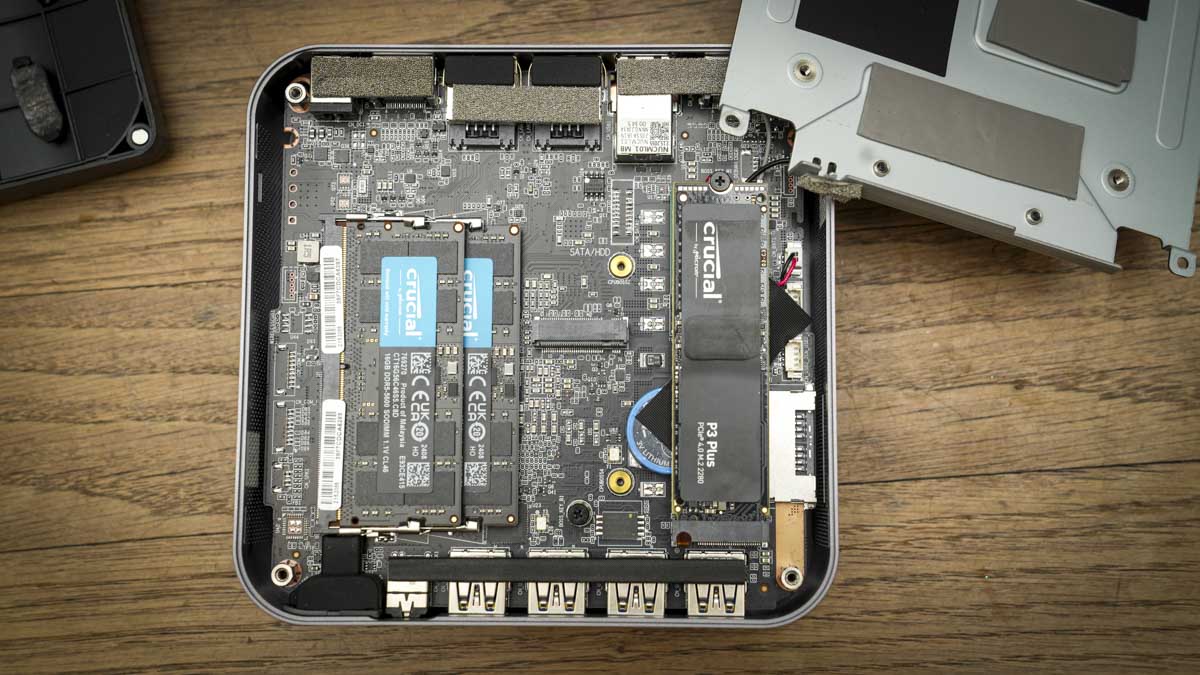
The Geekom GT1 Mega is priced at $1,099 and is available directly from Geekom with a 3-year warranty.
Right now, you can save 5% on the Geekom with the code TECHGT1 - from both the Geekom official US site and the official UK site.
You can also save 5% with code TECHRADAGT1 from Amazon US.
- Score: 4/5
Geekom GT1 Mega: Design & build
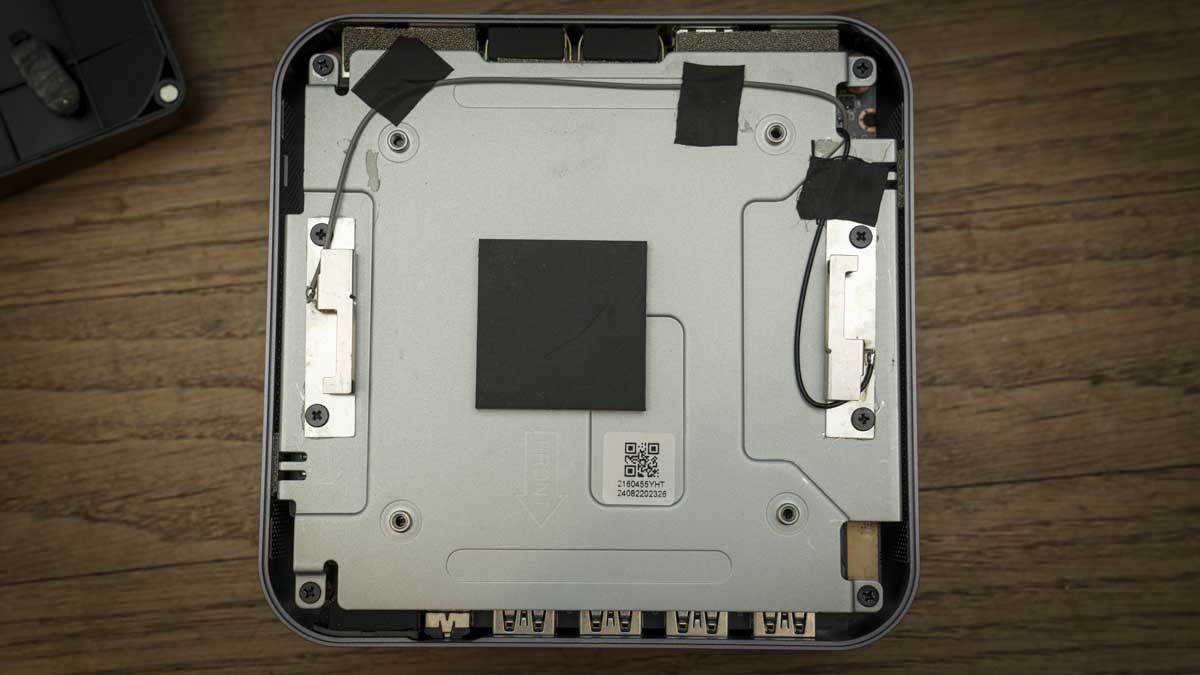
The GT1 Mega is housed in a compact form factor (135mm x 132mm x 46.9mm) that is common for mini PCs, which instantly makes it an ideal choice for anyone with limited workspace or requiring a machine that is easily portable between places of work. The exterior of the machine is of an extremely high quality, with the all-metal finish instantly giving the impression of quality and style. The simple monocoque design of the casing, with the line of four USB 3.2 Gen 2 ports, 3.5mm audio, and power button, are all neatly laid out, highlighting accessibility.
That look helps to define this system as a core unit that can adapt to what you need it to do. For creatives, accessories such as the Logitech MX Creative Console, keyboard, and mouse can all be plugged in easily without searching around the back. Then on the side, alongside plenty of venting, which alongside the IceBlast 2.0 cooling system helps to keep on top of the heat from the fast processor, is an SD 4.0 card slot—a feature that will appeal to photographers and videographers, although a CFExpress Type-B slot would be great to see. On the other side, for security, there's a Kensington port.
Flipping over to the back, and again there’s a host of connections, including two USB 4.0 and dual 2.5Gbps Ethernet ports, two HDMI 2.0, a USB Type-A 3.2, and one USB 2.0 port.
The overall build is of a high quality, and flipping the machine onto its back, there are four small rubber feet and the hole for the VESA mount. Unscrewing the base gives you access to the inside, where there’s the option to upgrade the RAM from the 32GB to 64GB and swap the PCIe SSD NVMe Gen 4, although our review sample was already fitted with the 2TB version, which is the maximum.
- Design: 4.5/5
Geekom GT1 Mega: Features
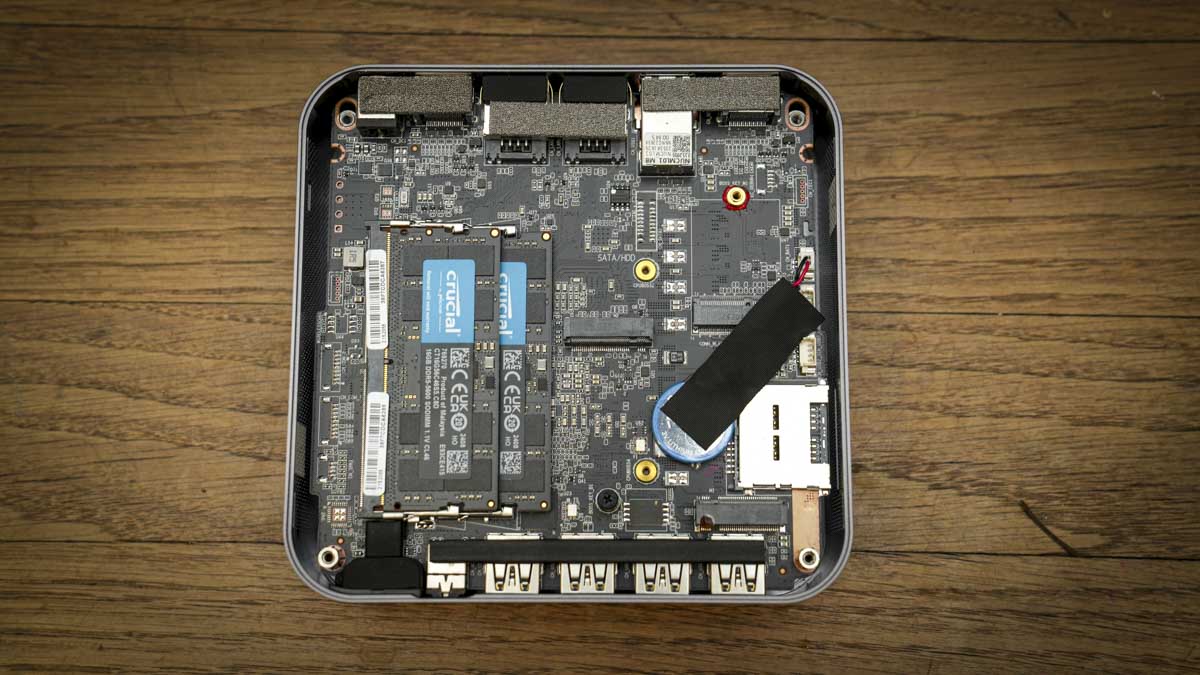
The Geekom GT1 Mega features Intel's 14th Gen Ultra U9-185H processor with 16 cores and 22 threads. It also features an AI-accelerated NPU, which is capable of delivering processing up to 8 times faster than the previous generation and enables you to access the latest machine learning tasks and compatibility with AI-enabled applications that can make full use of the new technology.
Visuals are supplied through Intel Arc graphics, which support both high-resolution video and gameplay, as well as the ability to run multiple displays from the system. This includes up to four 4K monitors or one 8K.
Inside, the machine features 32GB of Dual-channel DDR5-5600 SODIMM, which can be upgraded to 64GB. This is matched with 2TB of M.2 2280 PCIe Gen 4 x 4 SSD, which is the maximum that the machine can take.
Connections are a key feature of this small machine, and when it comes to networking, alongside the dual RJ45 2.5Gbps ports, there's also Wi-Fi 7 and Bluetooth 5.4, further enhancing connection options.
Alongside the latest Intel processing, the big point of interest here is the expansion options. While those are limited internally, the ability to utilise the two USB4 ports along with the USB 3.2 Gen ports gives you plenty of options. Although the internal graphics are good, if you need the boost of a dedicated external graphics card, then an eGPU can easily be fitted. Likewise, ultra-fast external SSDs, NAS, and mass storage devices are all easily compatible.
The USB4 ports offer plenty of flexibility, with the ability to connect data devices, monitors, graphics, and even deliver up to 15W of PD power to quickly charge devices such as phones, tablets, and camera gear.
When it comes to portability, the small form factor and solid metal build make it nice and robust, but if you're working in the field, then the fact that it only draws 65W of power means that it will sit alongside a portable computing suite that can be used in the field without too much of an issue and powered by a portable power station. However, it does utilise a 19V DC input rather than the more universal USB Type-C, so the external power adapter is required.
- Features: 4.5/5
Geekom GT1 Mega: Performance
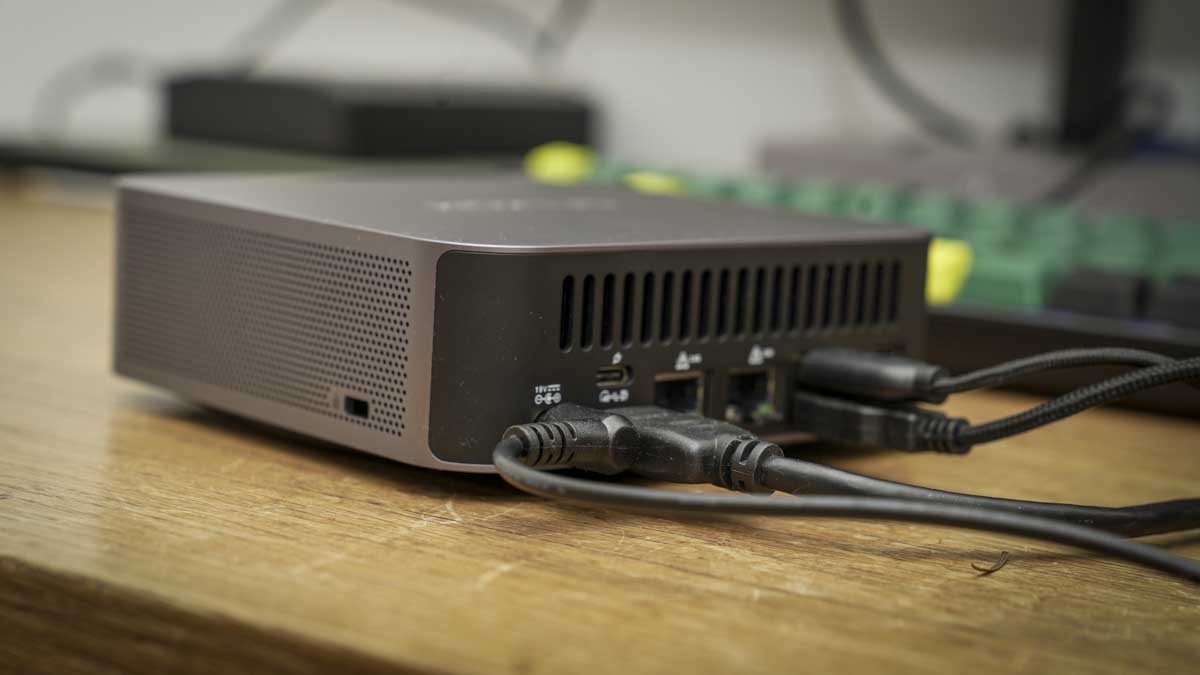
Crystal Disk Read: 5049.75MB/s
Crystal Disk Write: 4399.79MB/s
GeekBench CPU Single: 2498
GeekBench CPU Multi: 13916
GeekBench Compute: 39696
PC Mark: 6992
CineBench CPU Multi: 15911
CineBench CPU Single: 1888
Fire Strike Overall: 8133
Fire Strike Graphics: 8886
Fire Strike Physics: 29083
Fire Strike Combined: 2995
Time Spy Overall: 4072
Time Spy Graphics: 3642
Time Spy CPU: 12306
Wild Life: 20948
Windows Experience: 8.3
Getting started with the GT1 Mega is fast, with the usual run-through of options for Windows 11 Pro. Once installed, the WiFi connection to install updates and applications is fast, and there’s little slowdown as you switch from browsing to applications and general use of the machine. Starting with the range of Microsoft Office apps, the machine is simply fast and responsive, with the apps loading quickly. Navigating large Word documents, presentations, and long spreadsheets is handled with no issues or slowdowns. Essentially, the machine just makes short work of this level of applications.
Likewise, two of the best photo editors, Adobe Lightroom and Photoshop, caused no issues, with the batch RAW processing of files from the Canon EOS R5C handled without a hitch. We also tested the machine with some of the best video editing software. RAW files along with 4K video Log3 footage from the Sony A7 IV were edited within Adobe Premiere Pro with the same ease. The only issue with video editing was the volume of internal storage; however, switching to using an external 8TB Samsung T5 Evo quickly resolved this, enabling impressive ease of editing for a 15-minute video.
Finally, looking at gaming performance, three games were tested: Tekken 8, Cyberpunk 2077, and Hogwarts Legacy. In all cases, the machine was able to handle most of the graphic processing, though with some minor lag in Hogwarts Legacy. However, a Razer Core X eGPU with ASUS GeForce 3060 Ti gave a boost to the graphics performance.
Once the external SSD and eGPU were added to the mix, the power of this small machine matched desktop PCs without issue, offering an incredibly small and effective solution for creative professionals looking for a compact and portable machine that can be used in the field.
Finally, with the performance tested, we checked out how the machine coped with our benchmarking tests. Here, the real-world tests were reflected, with the Geekom GT1 Mega excelling across the board. The Intel Ultra U9-185H processor offered strong multi-core performance, scoring 15,911 in Cinebench CPU multi-core tests, highlighting what we had witnessed during video editing. Storage speeds using the internal SSD are fast, with CrystalDisk scores of 5049.75MB/s for read and 4399.79MB/s for write, ensuring quick boot times and rapid data transfers. Although the 2TB storage will be ample for most users, creatives should look at an external storage solution such as the Samsung T5 Evo or OWC Envoy as an option.
If you do need to access the internal workings of the machine for an upgrade, the process is a little more involved than most. First, the four rubber feet need to be removed, then the four screws taken out, and the base prised off. Then there's the backing plate, which is again held by four screws; this needs to be carefully lifted away as there are two wires connected to the WiFi card. With the base plate propped up, you can access the M.2 Key-M slot for PCIe x4 Gen 4 NVMe SSD, 2280, and dual RAM slots, along with the M.2 Key-M slot PCIe x4 or SATA, 2242. It's also worth noting that the M.2 Key-E slot for CNVi/PCIe WiFi, 2230, can be upgraded, giving some future-proofing. Another interesting feature is the 16-pin FPC SATA connector to connect an FFC SATA cable to a 7mm 2.5" SATA, which opens up further options.
While overall the performance is excellent, the graphics performance is just above average, with the Intel Arc handling most tasks. However, the Fire Strike and Time Spy results show that when pushed, an eGPU should be considered, as we found with Hogwarts Legacy.
Overall, when it comes to performance, the core machine punches well above its size, but what really appeals is the fact that, with applications that support AI, this machine can see a real boost in performance. And if you need more storage for video or graphics for gaming, then an external drive or eGPU can be quickly fitted. The Geekom GT1 is one of the most impressive mini PCs available, with solid build and performance that will suit most creative and high-demand users.
- Performance: 4/5
Should you buy the Geekom GT1 Mega?
The Geekom GT1 Mega is a great option for professionals or creatives who need robust computing power in a compact form. Its AI processing and excellent multitasking capabilities make it a great mini PC, though its high price and limited internal, might be an issue for some.
| Row 0 - Cell 0 | Row 0 - Cell 1 | Row 0 - Cell 2 |
| Value | Great AI-boosted performance, but high cost limits appeal | 4 |
| Design | Sleek, compact, well-ventilated, but fans are audible | 4.5 |
| Features | Comprehensive connectivity, AI enhancements, and storage and GPU can be upgraded through USB4 connections | 4.5 |
| Performance | Excels in multitasking, but gaming potential is limited | 4.5 |
| Total | High-performance mini PC with niche appeal due to pricing | 4.5 |
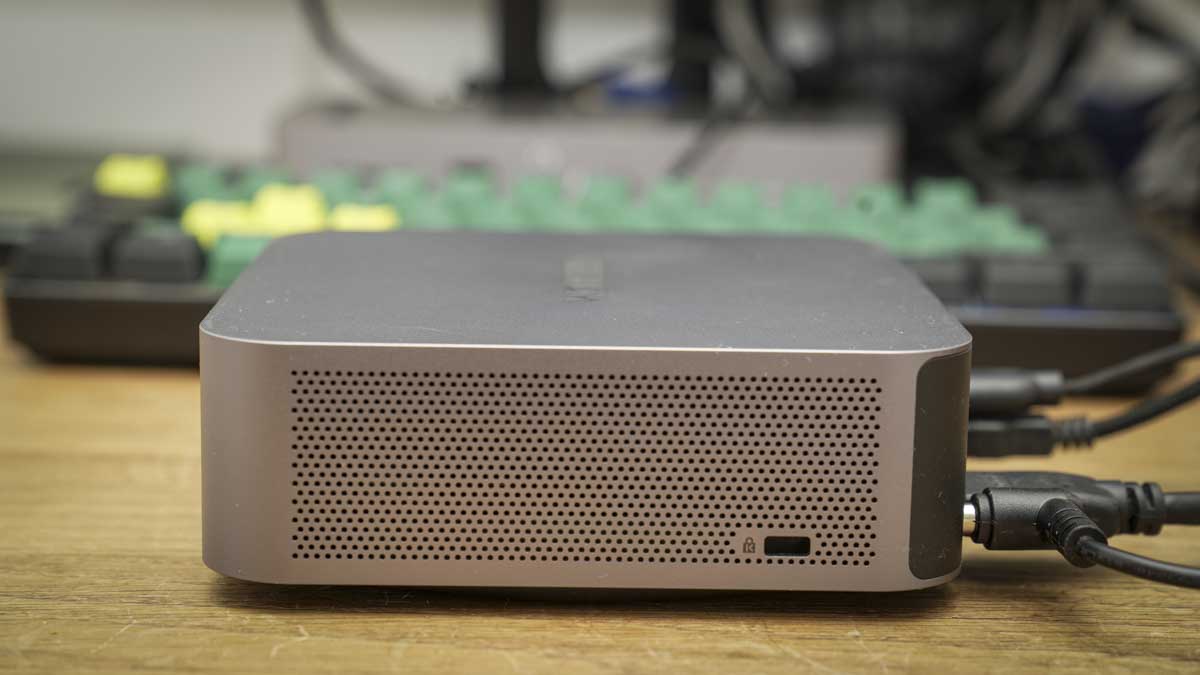
Buy it if...
You need AI-accelerated processing
If your work involves AI tasks, machine learning, or real-time data analysis, the GT1 Mega’s NPU will greatly enhance productivity.
You require multiple high-res displays
The ability to support four 4K monitors or one 8K display makes this mini PC perfect for video editing or digital content creation.
Don't buy it if...
You're on a budget
At nearly £1,000/$1,000, the GT1 Mega's cost is a barrier for casual users or those who don’t need cutting-edge performance.
You want extensive gaming capabilities
While capable, its Intel Arc graphics won't compete with a dedicated gaming PC for high-end gaming performance
For more professional machines, we reviewed the best business computers and best business laptops.
